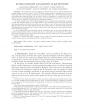Free Online Productivity Tools
i2Speak
i2Symbol
i2OCR
iTex2Img
iWeb2Print
iWeb2Shot
i2Type
iPdf2Split
iPdf2Merge
i2Bopomofo
i2Arabic
i2Style
i2Image
i2PDF
iLatex2Rtf
Sci2ools
121
click to vote
STOC
2001
ACM
2001
ACM
Buffer overflow management in QoS switches
Abstract. We consider two types of buffering policies that are used in network switches supporting Quality of Service (QoS). In the FIFO type, packets must be transmitted in the order in which they arrive; the constraint in this case is the limited buffer space. In the bounded-delay type, each packet has a maximum delay time by which it must be transmitted, or otherwise it is lost. We study the case of overloads resulting in packet loss. In our model, each packet has an intrinsic value, and the goal is to maximize the total value of transmitted packets. Our main contribution is a thorough investigation of some natural greedy algorithms in various models. For the FIFO model we prove tight bounds on the competitive ratio of the greedy algorithm that discards packets with the lowest value when an overflow occurs. We also prove that the greedy algorithm that drops the earliest packets among all low-value packets is the best greedy algorithm.
Related Content
| Added | 03 Dec 2009 |
| Updated | 03 Dec 2009 |
| Type | Conference |
| Year | 2001 |
| Where | STOC |
| Authors | Alexander Kesselman, Zvi Lotker, Yishay Mansour, Boaz Patt-Shamir, Baruch Schieber, Maxim Sviridenko |
Comments (0)

